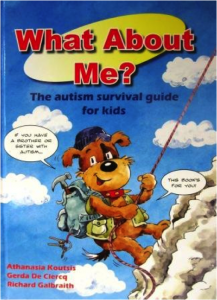Siblings of children with autism may experience a range of emotions and challenges. The experience of each sibling will be individual and unique. Harris and Glasberg (2012) suggest that most siblings: 1
- Have a genuine love for their brother or sister with autism
- Would like to learn how to interact with their brother or sister more comfortably
- Wish their parents had more time to spend with them (although as they get older they understand why there might be an imbalance)
Siblings of a brother or sister with autism may:
- Not understand what autism is. They may wonder “why does he do that?”
- Be reluctant to upset their parents by expressing their fears and feelings
- Be embarrassed by unusual things their brother/sister does
- Feel protective of their brother/sister
Many siblings grow up and reflect on the personal benefit of growing up with a sibling with autism. They say they have:
- Become more compassionate and accepting of other people with differences
- Been inspired by their brother or sister
- Chosen specific professional careers as a result of growing up with their sibling with autism
What helps?
Research23 indicates the following strategies can help improve the resilience and overall well being of siblings:
- Set aside time for parents to spend exclusively with siblings
- Provide open and positive information to support the sibling to understand their brother or sister’s autism
- Listen to and value the siblings’ opinions
- Arrange for the future care of the young person with autism. Invite the sibling to be involved in this future planning.
- Create opportunities for the family to do things together
- Create opportunities for the sibling to express their feelings
- Encourage the siblings’ friendships
- Seek professional support if needed
- Look after yourself and each other – when parents are calm and respectful their children feel less stressed
The Raising Children’s Website article ‘Helping siblings of children with Autism Spectrum Disorder’, identifies some ways in which a parent or carer can help a sibling understand their brother or sister’s autism:
- Talk openly about autism from an early age
- Answer questions with clear factual answers appropriate to their level of understanding
- Explain the similarities as well as the differences between the siblings
- Acknowledge the strengths of the child with autism but also point out the challenges
- Access good books and resources.
Good resources:
- What About Me? The Autism Survival Guide For Kids by Anthanasia Koutsis, Gerda De Clercq, Richard Galbraith – available from the Autism Tasmania resource library
- Siblings of Children with Autism: A guide for families by Sandra Harris and Beth Glasberg – available from the Autism Tasmania resource library
- The Organisation for Autism Research’s

S. Harris, & B. Glasberg (2012). Siblings of Children with Autism. Bethesda, MD: Woodbine House, Inc.↩
Mailick Seltzer, M. et al (2009) Siblings of individuals with an autism spectrum disorder: Sibling relationships and wellbeing in adolescence and adulthood, Autism, 13, pp. 59-80,↩
Hasting, R. (2003) Brief report: Behavioural adjustment of siblings of children with autism, Journal of Autism and Developmental Disorders, 33(1), pp. 99-104↩
